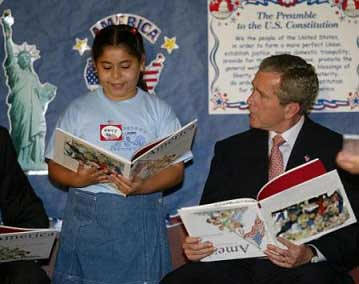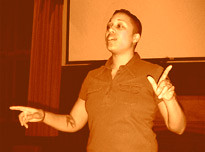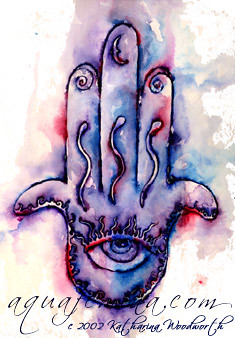For a while now, I've been meaning to write something more about Anida Yoeu Eseguerra on Planet Grenada. I think she has an interesting perspective because she's a Muslim spoken word artist who deals with cultural/political issues but isn't ethnically "typical" for a Muslim in America. (She describes herself as a "non hyphenated Cambodian Muslim American woman"). Since she actually wrote me an e-mail a few days ago, I figure I will actually show some love and post one her poems. (Y'all should also check her website: atomicshogun.com where she has more poems, audio and visual files of other performances, booking info, etc.)
The Day After
A Cento based on Hate Crimes filed shortly after 9/11
Awoke to signs,
“Terrorists'' sprayed in red paint across their family's driveway,
“Terrorist on board'' written on their white car.
Awoke to find,
freeway sign says, "Kill all Arabs"
elevator sign says, "Kill all towel heads"
A Pakistani Muslim living in L.A.
awoke to find his car scratched across
the right side with the words “Nuke ‘em!”
Awoke to find
300 march on a mosque in Bridgeview, IL.
300 American flags shout "USA! USA!"
Mosque awoke to find a 19-year-old shouting
"I'm proud to be American, I hate Arabs and I always have."
Firebomb tossed,
Taxi driver pulled out and beaten,
Vandals in Collingswood, N.J. attacked two Indian-owned businesses.
Vandals spray-painted "leave town."
Awoke to find
a South Asian American,
Sikh, chased by a group of four men yelling "terrorist.”
Sikh mistaken as a Muslim American.
Back up.
Sikh man, 69, shot.
Body found in a canal
He had a turban on.
Turban mistaken as a Muslim American.
A vehicle of white males,
followed and harassed a 21-year-old female.
Attackers yelled, "Go back to your own country!"
The attackers’ car pinned her against another vehicle.
Then they backed up and ran over her again.
Kimberly—a 21-year-old
Back up. A 21-year-old full blood Creek
Back up. Full blood Creek Native American
Mistaken as a Muslim American
Awoke to find,
a Pakistani native beaten by three men.
Back up. Egyptian American, 48, killed point-blank
Back up. Sikh man, 49 shot.
Shooter shouted, "I stand for America all the way."
Back up.
A man pushing a baby stroller walked by a mosque
He stopped and started yelling,
"You Islamic mosquitoes should be killed."
Mosquitoes mistaken as Muslim Americans.
Awoke to find two women speaking Spanish in a doctor's office.
A Caucasian woman yells, "You foreigners caused all this trouble,"
and begins to beat one of the women.
Spanish mistaken as Muslim.
Back up.
She asks the woman if she is Arab,
And then punches her in the eye.
Awoke to be mistaken.
A woman wearing Muslim clothing was shopping.
A Caucasian woman began attacking her and yelled,
"America is only for white people."
Back up. America mistaken for white people.
Armed man sets fire to a Seattle mosque.
300 march on mosque in Bridgeview, IL.
Mosques in Carrollton, Denton and Irving, Texas, attacked.
Muslim student at Arizona State University attacked.
Afghan restaurant in Fremont attacked with bottles and rocks.
Two suspects wrote "die" on a Persian Club booth.
A gasoline bomb is thrown
through the window of a Sikh family's home,
hitting a 3-year-old on the head.
Two women at a bagel store, attacked
for wearing a Quranic charm around her neck.
Attacker lunges,
Yells, "Look what you people have done to my people"
No one in the store tried to help.
The owner apologized to the attackers for any inconvenience.
300 march on two women
No one tried to help.
Two women awoke to find
an explosion from a cherry bomb
outside the Islamic Center of San Diego.
San Diego mistaken for Muslim Americans
"Look what you people have done to my people."
300 march on mosque in Bridgeview, IL
No one tried to help.
Sign says, "Kill all Arabs."
Sign says, "Kill all towel heads."
Towels mistaken for Muslim Americans
No one tried to help.
Vandals attack.
No one tried to help.
He had a turban on.
No one tried to help.
Sign says, "Look what you people have done”
Flags wave in an Afghan restaurant.
300 march against Spanish spoken at a doctor’s office
Spanish mistaken for Muslim Americans
300 march on two women at a bagel store
Bagels mistaken for Muslim Americans
300 wave cherry bombs.
Bombs march on 300 Sikhs,
hitting a 3-year-old on the head.
Look what you people have done.






